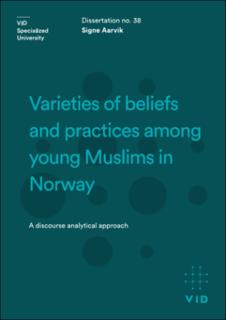| dc.contributor.author | Aarvik, Signe | |
| dc.date.accessioned | 2022-12-16T15:03:11Z | |
| dc.date.available | 2022-12-16T15:03:11Z | |
| dc.date.issued | 2021 | |
| dc.identifier.isbn | 978-82-8456-001-4 | |
| dc.identifier.issn | 2535-3071 | |
| dc.identifier.uri | https://hdl.handle.net/11250/3038337 | |
| dc.description | Dissertation Submitted in Partial Fulfilment of the Requirements for the Degree of Philosophiae Doctor (Ph.D), VID Specialized University, Centre of Mission and Global Studies, Stavanger 2021 | en_US |
| dc.description.abstract | Research on young Muslims in Norway has tended to focus more on those who are active in Muslim organisations than those who construct their beliefs and practices mainly apart from such settings and communities. The aim of this study is to increase our knowledge regarding the religiosity of young Muslims who are situated in highly secular and religiously pluralistic social contexts outside of their family. The approach is discourse analytical, and the research aim is to investigate what discourses that are reproduced, combined, transformed, and contested in a sample of young Muslims’ articulation of their beliefs and practices. Interviews with fifteen (Sunni) Muslims aged 20-32 are analysed. The findings are presented and discussed in three articles and in the extended abstract. An overarching finding is a great variation in the discursive repertoires, and thereby in ways to ‘be a Muslim’, and that this variation is connected to belonging and identification with different environments outside the young Muslims’ family of origin.
The first article taps into discussions regarding the extent and forms of religious individualisation among young Muslims in Western Europe. In line with the discourse analytical framework, individualisation is conceptualised as a liberal moral discourse becoming authoritative in the shaping of peoples’ beliefs and practices. The article investigates how this discourse is negotiated in relation to the Islamic orthodox discourse which revolves around ideas of submission and obedience to a normative framework. It finds a variety of ways to negotiate and combine the two discourses, and thereby highly different religious identities, depending on which discursive premises and logics that are dominant in the individual Muslim’s repertoire. It is argued that the variation is connected to the young Muslims different degrees of identification with and situatedness in dominantly ‘Muslim’ social environments on the one hand, and highly secular-pluralistic environments on the other.
The second article looks at how the Islamic orthodox and the liberal moral discourse intersect in different ways with a ‘therapeutic’ religious discourse. While this vocabulary and outlook is found to be highly dominant in the material, there are also examples of how the ‘individualistic ethos’ of the therapeutic discourse is limited by, or adjusted to, an alternative Islamic orthodox conceptualisation of self-realisation. The study also finds a different religious vocabulary among some of the interviewees which centers more on social transformation and activism rather than personal transformation and wellbeing.
The third article looks at a sub-sample of the interviewees who distinguish themselves by constructing their religious identity explicitly in opposition to the Islamic orthodoxy and whose interpretations of Islamic concepts and practices are highly ‘subjectivist’ in that they are dominantly grounded in their own reasoning and experiences. It is argued that the commonalities in these young Muslims’ interpretations of Islam point to a convergence between the discourse of contemporary spirituality and non-orthodox Islamic discourses such as ‘progressive Islam’ and Sufism. Finally, it is argued that this convergence represents an alternative Muslim identity to the more secular or revivalist variants among young Muslims in Europe. | en_US |
| dc.description.abstract | | en_US |
| dc.language.iso | eng | en_US |
| dc.publisher | VID vitenskapelige høgskole, Stavanger | en_US |
| dc.relation.ispartofseries | Dissertation series for the Degree of Philosophiae Doctor (Ph.D.) at VID Specialized University;38 | |
| dc.title | Varieties of beliefs and practices among young Muslims in Norway : a discourse analytical approach | en_US |
| dc.type | Doctoral thesis | en_US |
| dc.description.version | submittedVersion | en_US |
| dc.rights.holder | All rights reserved. No part of this publication may be reproduced or transmitted, in any form or by any means, without permission. | en_US |
| dc.subject.nsi | VDP::Humaniora: 000::Teologi og religionsvitenskap: 150 | en_US |
| dc.source.pagenumber | 97 | en_US |
